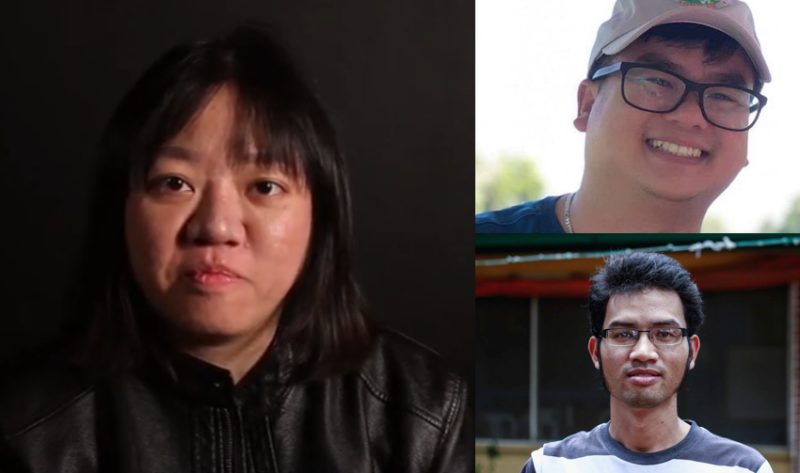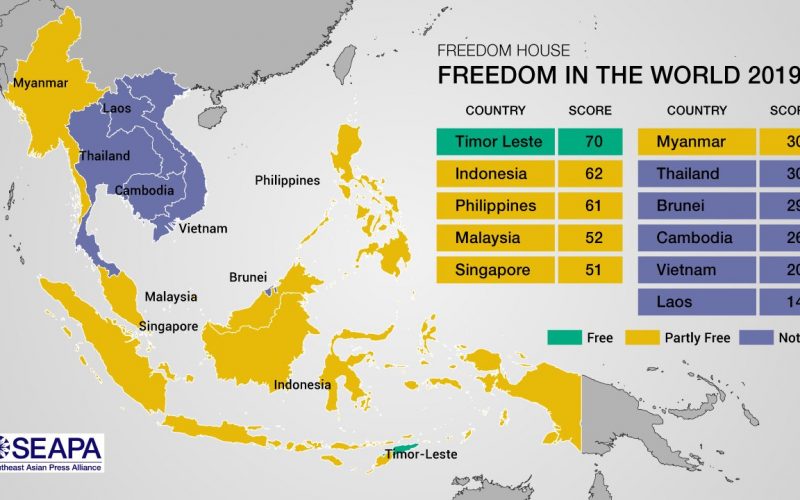
CIVICUS
This week’s jailing of Pham Doan Trang, who has been called Vietnam’s “most famous activist”, was “a searing indictment of everything that is wrong with authoritarian Vietnam today,” said Phil Robertson, deputy Asia director of Human Rights Watch.
Peaceful critics of the regime like Pham Doan Trang will continue to face persecution so long as the Vietnamese authorities continue to be empowered by overly broad laws like Articles 117 and 331, which criminalizes the spreading of “hostile” information and “abus(ing) democratic freedoms,” notes Stewart Rees, an advocacy associate at The 88 Project, a not-for-profit organization that promotes freedom of expression in Vietnam. These vague prohibitions enable the government to crack down on any criticism to which it takes exception. In spite of its poor record on freedom of expression, Vietnam is likely to be elected to the U.N. Human Rights Council next year, he writes for The Diplomat.

Vietnam political prisoners Pham Doan Trang (left): screenshot of YouTube video by Člověk v tísni; Le Huu Minh Tuan (lower right) and Truong Chau Huu Danh (upper right): Photos from The 88 Project.
Before her trial, Pham Doan Trang prepared a statement for publication, Human Rights Watch adds. The English version is available here. The original Vietnamese is available here.
In its latest report on closing civic space, CIVICUS said that out of 26 countries or territories in Asia, four – China, Laos, North Korea and Vietnam – were “closed”, while Myanmar was among the “repressed” states, following the February 1 military coup.
 Western governments’ claim that as they trade more with Vietnam, and make Hanoi increasingly dependent on economic links to free societies, they gain additional leverage to pressure the Vietnamese Communist Party (VCP) into purposeful political reform, notes analyst David Hutt. But so-called “change through trade” hasn’t worked. As Western trade with Vietnam has increased, political rights in Vietnam have deteriorated, he writes for The Diplomat:
Western governments’ claim that as they trade more with Vietnam, and make Hanoi increasingly dependent on economic links to free societies, they gain additional leverage to pressure the Vietnamese Communist Party (VCP) into purposeful political reform, notes analyst David Hutt. But so-called “change through trade” hasn’t worked. As Western trade with Vietnam has increased, political rights in Vietnam have deteriorated, he writes for The Diplomat:
A report published by Amnesty International in late 2020 asserted that around 170 prisoners of conscience are currently detained in Vietnam, a record high in recent history. The 88 Project asserts that there are now 217 activists in prison, and another 306 at risk. Freedom House, in its latest survey of political rights across the world, downgraded Vietnam’s score to 19 out of 100, the second-worst in Southeast Asia, after also-communist Laos.
Of the 30 arrests so far this year, there were several high-profile cases, Global Voices reports. For example, in January, the courts handed down some of the harshest sentences yet against several independent journalists: Pham Chi Dung, 55, a former reporter for Voice of America and founder of the Independent Journalists Association of Vietnam (IJAVN), was sentenced to 15 years in prison; Dung’s colleague, Nguyen Tuong Thuy, 69, a member of Radio Free Asia Vietnamese Service, received an 11-year sentence; Le Huu Minh Tuan, 32, another IJAVN member, was given 11 years. All three men were charged with the catch-all crime of “anti-state propaganda” under the vaguely worded Article 117, formerly known as Article 88.








